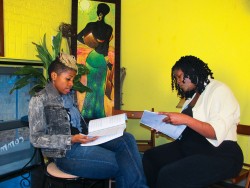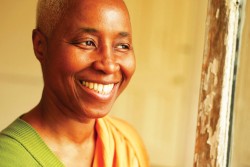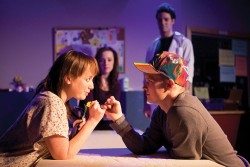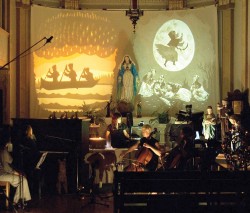 Until the last few years, musical theatre buffs in Toronto and the GTA had to rely on commercial theatres to satisfy their tastes, looking to companies like Mirvish Productions to keep them up-to-date with Broadway and West End hits. Today, things have changed to the point where musical theatre regularly appears in the city’s not-for-profit (NFP) theatres in forms new and old. And performers who cut their teeth in shows produced by Mirvish, Dancap and (the now-defunct) Livent Corp. are achieving marquee status with new and different audiences.
Until the last few years, musical theatre buffs in Toronto and the GTA had to rely on commercial theatres to satisfy their tastes, looking to companies like Mirvish Productions to keep them up-to-date with Broadway and West End hits. Today, things have changed to the point where musical theatre regularly appears in the city’s not-for-profit (NFP) theatres in forms new and old. And performers who cut their teeth in shows produced by Mirvish, Dancap and (the now-defunct) Livent Corp. are achieving marquee status with new and different audiences.
Nowhere is this more evident than in a big show co-produced by two of the city’s smallest theatres that opens on February 22 at the 918 Bathurst Centre for Culture, just north of Bloor St. Loosely based on historical texts of the infamous witch-hunts in 17th century Salem, Massachusetts, Obeah Opera views the trials through a Caribbean filter. “Producing this piece solidifies our mandate to present works from the [Black] Diaspora inspired by a Caribbean understanding,” says Rhoma Spencer, artistic director of Theatre Archipelago, one of the producing companies. Co-producer ahdri zhina mandiela, founder and artistic director of b current Performing Arts, and the show’s director, is even more emphatic with her endorsement: “Obeah Opera renews creative and cultural pride for both companies, our artists, and much of the audience.”
Nicole Brooks, who wrote the book, libretto and music for Obeah Opera, echoed mandiela’s sentiments in a chat we shared in early January. “The story that interests me takes place at the beginning of the witch trials, when the women are accused, because, of course, there’s very little known about them. I mean, they were slaves, so they barely figure in historical records.” She pauses, as if recognizing the contradiction implicit in her statement. “These women were silenced. Very little of what they said, if they were allowed to speak at all, has been documented. I have taken the liberty of giving them voices to tell their stories in their own way …”
Ironically, this led Brooks to opera, a form rarely connected with Black music. Rather that retreat from the challenge, she embraced it, but added a twist: “I adhere to the definition of ‘opera’ in its true terms, as ‘a play that is sung’; but I don’t feel that restricts me to classical music. What each character has to say leads me to a different genre of music, which also becomes part of that character’s voice …” Ultimately, she suggests, “the music in the piece is as contemporary as it is historical … the references are all over the place.”
Director mandiela agrees: “The music is the spine of Obeah Opera … mixing traditions of jazz, blues and spirituals from a myriad of Black cultures … ‘in the manner of the chapel,’ otherwise known as a cappella style. It’s like a game of musical telephone played cross centuries into now …”
Obeah Opera is a huge undertaking for Brooks: her first play, her first score, her first opera. And she performs one of the five leads — Candy, a Salem slave with oratorical skills and the ability to read. After Tituba, another slave, is accused of practising the outlawed rituals of obeah on and with young white girls, she and Candy, along with three other women, are confined by the town’s elders to a cell where each shares her personal account of the events that led to her arrest. Through the telling of their stories, the women form a bond strong enough to initiate a ceremony that conjures up a powerful presence — freedom — which Brooks uses to structure the ending of her show.
In transforming the witches of Salem to healers with various spiritual beliefs, Brooks tackles the taboo of obeah with the steadiness of vision she brings to her project in general. Neither condemning nor celebrating the controversial practice, she aims to create “a tribute to all those spiritual practices that had to go underground to survive: they do live today, but you have to look to see them. And that’s their true triumph — that they didn’t die with the people they represent ...”
Nevertheless, she worries about her own mother’s reaction to the show, a fear she confesses with laughter. “When I told her I was working on the piece, she said ‘so, you’re an obeah woman now, practising witchcraft …?’”
Brooks shakes her head: “Mercy, what have I done?”
Obeah Opera may not practise witchcraft, but it promises magic nonetheless. Requiring a cast of 15, the show would tax the resources of Toronto’s largest theatres, let alone two of its smallest. To meet the challenge, Spencer and mandiela have gathered a stellar group of women to perform all the roles, male and female. To play the five arrested slaves, Brooks is teamed with Ella Andell from Trinidad and Tobago, and Canadians Joni NehRita, Saphire Demitro, and Saidah Baba Talibah, who also can be seen (and heard!) this month in Honey Jam — Then and Now, an all-female showcase at Harbourfront’s Brigantine Room on February 3. Joining them in the ten-member chorus are Kanika Ambrose, Sheila Boyd and Jessica Brown, all well-known singers in their own right.
 For Brooks, mandiela supplied a dramaturge as well as a musical director, and guided her through a process of development that the neophyte writer couldn’t expect to find at many theatres, which she is first to acknowledge. “What’s good about b current, and small theatre in general, is the opportunity to spread your wings and explore. The [usual] problem is you don’t have the luxury of four or five months to rehearse …” She reflects for a moment. “And, you know, this is why I appreciate the [production] increments that ahdri made me go though. If, from the beginning, she had said ‘Write the whole thing,’ I don’t think we would be here. Instead, she said ‘Start with ten minutes’; then she got us into [Buddies in Bad Times] Rhubarb! Festival, where we had 20 minutes; then she asked me for 30 minutes. Finally she said, “Nicole, write the whole damn thing; you can do it.”
For Brooks, mandiela supplied a dramaturge as well as a musical director, and guided her through a process of development that the neophyte writer couldn’t expect to find at many theatres, which she is first to acknowledge. “What’s good about b current, and small theatre in general, is the opportunity to spread your wings and explore. The [usual] problem is you don’t have the luxury of four or five months to rehearse …” She reflects for a moment. “And, you know, this is why I appreciate the [production] increments that ahdri made me go though. If, from the beginning, she had said ‘Write the whole thing,’ I don’t think we would be here. Instead, she said ‘Start with ten minutes’; then she got us into [Buddies in Bad Times] Rhubarb! Festival, where we had 20 minutes; then she asked me for 30 minutes. Finally she said, “Nicole, write the whole damn thing; you can do it.”
 Unlike Obeah Opera, which is totally Canadian, Dani Girl was created by Christopher Dimond (book and lyrics) and Michael Kooman (music), a creative dynamo at the vanguard of American musical theatre. The show, which opens at Theatre Passe Muraille on February 16, has “a very lengthy and solid book,” explains Richard Ouzounian, its director, with “musical numbers used to elaborate feelings, or to create the mood of the fantasy sequences” that it employs throughout. “The show largely follows conventional traditions of musical theatre (songs, reprises, etc.) but uses pastiche in the fantasy sequences. The more realistic songs are presented in a style that, while not ‘old-fashioned,’ avoids the clichés of rock, etc.” Like Obeah Opera, Dani Girl was first produced in Canada by a small theatre with minimal resources — Talk is Free Theatre, in Barrie. Arkady Spivak, TIFT’s enterprising producer, hired Ouzounian, best known as a theatre critic for the Toronto Star, to direct the piece last January. For this month’s Toronto remount, Ouzounian replaces Jake Epstein from the original cast, with Jeff Madden, who won a DORA award in 2009 for playing Frankie Valli in the Dancap production of Jersey Boys. Joining him and Amanda LeBlanc are the two stars of the original cast, Jonathan Logan and Gaby Epstein who won a DORA nomination for her performance in To Life (a musical revue by Avery Saltzman and Tim French that the Harold Green Jewish Theatre, another NFP company, premiered in Toronto last year). And the calibre of the production team for Dani Girl matches the pedigree of its cast.
Unlike Obeah Opera, which is totally Canadian, Dani Girl was created by Christopher Dimond (book and lyrics) and Michael Kooman (music), a creative dynamo at the vanguard of American musical theatre. The show, which opens at Theatre Passe Muraille on February 16, has “a very lengthy and solid book,” explains Richard Ouzounian, its director, with “musical numbers used to elaborate feelings, or to create the mood of the fantasy sequences” that it employs throughout. “The show largely follows conventional traditions of musical theatre (songs, reprises, etc.) but uses pastiche in the fantasy sequences. The more realistic songs are presented in a style that, while not ‘old-fashioned,’ avoids the clichés of rock, etc.” Like Obeah Opera, Dani Girl was first produced in Canada by a small theatre with minimal resources — Talk is Free Theatre, in Barrie. Arkady Spivak, TIFT’s enterprising producer, hired Ouzounian, best known as a theatre critic for the Toronto Star, to direct the piece last January. For this month’s Toronto remount, Ouzounian replaces Jake Epstein from the original cast, with Jeff Madden, who won a DORA award in 2009 for playing Frankie Valli in the Dancap production of Jersey Boys. Joining him and Amanda LeBlanc are the two stars of the original cast, Jonathan Logan and Gaby Epstein who won a DORA nomination for her performance in To Life (a musical revue by Avery Saltzman and Tim French that the Harold Green Jewish Theatre, another NFP company, premiered in Toronto last year). And the calibre of the production team for Dani Girl matches the pedigree of its cast.
Like Caroline, or Change, the ambitious musical that Acting Up Stage Company and Obsidian Theatres opened at the Berkeley St. Theatre last month, Dani Girl is noteworthy for the ways it uses the conventions of musical theatre to communicate a socially relevant plot that potentially is as depressing as it is odd. After losing her hair to leukemia, Dani, a precocious nine-year-old girl, embarks on a magical journey to try to get it back. Writing for a cast of four, Dimond and Kooman structure her quest as a dramatic comedy, going so far as to allow the two leads to be played by adults or children. The roles Dimond has written, like Kooman’s music, appeal to performers who want to act as well as sing, to step outside the box of musical theatre as it traditionally is figured to participate in an experience that is, in the words of Arkady Spivak, “off-centre.”
Spivak uses the term “off-centre music theatre” to describe “musicals that are not initially or obviously intended for commercial production, that offer a higher proportion of artistic ambition over commerce, or are simply under-produced.” For him, “these range from things like Ride the Cyclone [the musical/cabaret by Victoria’s Atomic Vaudeville that Acting Up co-produced with TPM last November] to failed musicals by major writers — something like Dear World by Jerry Herman — shows that were done on Broadway but didn’t succeed. In other words, material you wouldn’t expect a large regional theatre to program with an eye to increasing its ticket revenues …”
Certainly, a musical about childhood cancer would seem to qualify. More to the point, a musical that allows the audience to view the subject without succumbing to tears — maybe, even to laugh about it — seems doubly appropriate. This is not to say that Dani Girl treats its subject lightly. Indeed, for Richard Ouzounian, Dimond and Kooman’s “inventive and honest” approach is what sustains his interest in the remount. “I am deeply touched by the theme,” he points out, “which, ultimately, is about how we all have to deal with the issue of death, whether it comes early or late.”
Ultimately, Dani Girl does what musicals do best: provide joy in the face of unhappiness. This is one of the reasons Spivak was able to attract Show One Productions to co-produce the project. “What’s unique here,” he tells me, “is that we’re a not-for-profit theatre and they’re a commercial promoter, so this venture is new to both of us.” Another reason he won Show One’s involvement is the runaway success of TIFT’s production of Assassins by Stephen Sondheim — an example of “off-centre music theatre” par excellence: “We produced Assassins with Toronto’s Birdland Theatre, both in its original run in 2010 and its remount in Toronto in 2011. I am certain that the Dani Girl transfer, while solid on its own merits, is an extension of the success of Assassins.”
Spivak might just as well cite the success of Parade (Jason Robert Brown and Alfred Uhry) that Studio 180 produced last season, or The Light in the Piazza (book by Craig Lucas, music and lyrics by Adam Guettel) that Acting Up mounted in January 2010: both shows are adamantly “off-centre” in their aesthetics and history, and each has contributed to the flurry of activity in Toronto’s NFP theatres that now is so wide-spread it attracts the attention of independent producers. You can do it. These days, the attitude inspires the creation of musical theatre all across the GTA.
Looking for more “off-centre” music theatre this month? Check out any of the following, and you won’t be disappointed.
Since its founding in 1995, Queen of Puddings Music Theatre has been acknowledged as “boundary-bursting” for its innovative creations, “an exciting artistic force within the community of Toronto theatre companies,” as Matthew Jocelyn, the artistic and general director of Canadian Stage Theatre, recently put it. No wonder, then, that Canadian Stage is co-producing Beckett: Feck-it, the Puddings’ new project that Jocelyn calls “a feisty, original exploration … anchored by the work of an incomparable playwright.” He’s referring, of course, to Samuel Beckett, the prolific Irish writer who borrowed techniques from music composition to structure some of the most provocative novels and plays of the 20th century, works whose mordant wit revels in ridiculous irreverence even as it mines a deep reservoir of melancholia. This new production, opening at the Berkeley St. Theatre on February 17, reunites Jennifer Tarver, a Canadian director renowned for her Beckett productions, with Dáirine Ní Mheadhra and John Hess (music direction), to showcase a dynamic Canadian cast: Laura Condlln, Michal Grzejszczak, Sofia Tomic, and the marvellous Tom Rooney whose multi-layered performance of Malvolio in Twelfth Night won accolades this past season at Stratford.
The accomplished quartet of actors shares the stage with soprano Shannon Mercer and trumpet player Michael Fedyshyn to perform Beckett’s Come and Go, Ohio Impromptu, Act Without Words II and Play, along with the musical selections Trumpeter by Gerald Barry, Drei Gesänge by Andrew Hamilton, and the Gaelic folk-song Eleanór a Rún by Cearbhall Ó Dálaigh.
 Even farther off-centre, if that’s possible, is Everything Under the Moon, a collaboration between Toronto visual and performance artist, Shary Boyle, and Christine Fellows, a Winnipeg songwriter/musician, that Harbourfront Centre presents as part of its 2012 World Stage season, in association with the Power Plant Contemporary Art Gallery, at the Enwave Theatre, opening on February 18. An old-time shadow play re-imagined, the performance integrates hand-animated, real-time projected images with live music and song to tell the story of two small, winged creatures (a honey bee and a little brown bat) that set out to save themselves and their species. Using multiple overhead projectors, costumes and puppets to bring Boyle’s artwork to life, along with an original score by Fellows performed on xylophone, timpani, wurlitzer, ukulele, cello, trumpet and percussion, Everything Under the Moon touches on loss, environmental threat, adaptation and the restorative powers of friendship and community, championing the collaborative spirit as a means of survival.
Even farther off-centre, if that’s possible, is Everything Under the Moon, a collaboration between Toronto visual and performance artist, Shary Boyle, and Christine Fellows, a Winnipeg songwriter/musician, that Harbourfront Centre presents as part of its 2012 World Stage season, in association with the Power Plant Contemporary Art Gallery, at the Enwave Theatre, opening on February 18. An old-time shadow play re-imagined, the performance integrates hand-animated, real-time projected images with live music and song to tell the story of two small, winged creatures (a honey bee and a little brown bat) that set out to save themselves and their species. Using multiple overhead projectors, costumes and puppets to bring Boyle’s artwork to life, along with an original score by Fellows performed on xylophone, timpani, wurlitzer, ukulele, cello, trumpet and percussion, Everything Under the Moon touches on loss, environmental threat, adaptation and the restorative powers of friendship and community, championing the collaborative spirit as a means of survival.
Finally, on February 22, Theatre Ad Infinitum Canada, a new company, joins Why Not Theatre to launch the Canadian premiere of The Big Smoke, a well-received production by its sister company in the UK, at the Factory Studio Theatre. Promising “a poetic waltz with death inspired by the lives of Virgina Woolf, Sylvia Plath and Anne Sexton,” this one-woman show is performed a cappella by Amy Nostbakken, a Canadian singer/performer who, along with director, Nir Paldi, wrote the script. Combining physical theatre and music, the sung-through play tells the story of a brilliant young artist from Toronto who, given the opportunity of a lifetime (a solo exhibition at London’s Tate Modern Gallery), takes a downward spiral into depression and, finally, madness. After premiering the show to rave reviews at the Edinburgh Festival in 2010, Nostbakken toured the production across England for three months before deciding to bring it to Canada. With this show, she should feel right at home.
—Robert Wallace
Based in Toronto, Robert Wallace writes about theatre and performance. He can be contacted at musictheatre@thewholenote.com.



